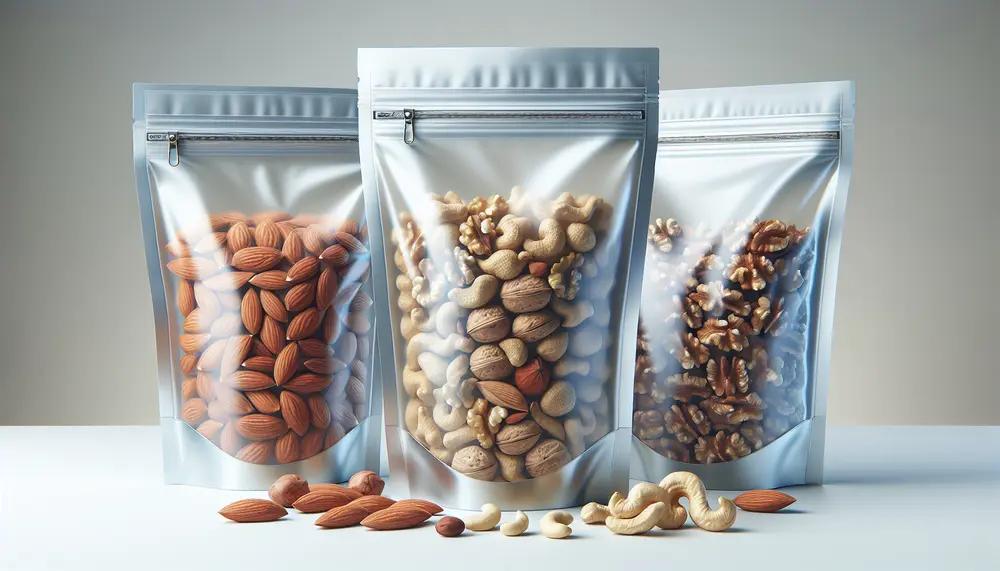Table of Contents:
Understanding Nut Bags and Their Benefits for Snack Packaging
When we talk about nut bags, we're referring to a specific type of packaging that is particularly well-suited for housing snacks like nuts, seeds, and dried fruits. These bags are not just any ordinary packaging; they serve multiple purposes that both benefit the consumer and the environment. Let's dive into why nut bags are quickly becoming the ideal solution for snack packaging.
Nut bags are incredibly versatile. Typically made from materials such as organic cotton, they come with a drawstring closure that helps keep snacks fresh and secure. Their material construction ensures that they can be reused, reducing the need for single-use plastics—a significant step towards eco-friendliness.
Preservation of taste and quality is another key advantage. Unlike plastic, the materials used in nut bags often allow the contents to "breathe," which can help in maintaining the freshness and natural flavor of the snacks. This is especially important for organic or all-natural snacks where preservatives are absent.
These bags also contribute to health and safety. With features such as natural materials and non-toxic dyes, consumers can be assured that their food is stored in containers that won’t leach harmful substances into their snacks.
Lastly, nut bags come in a variety of sizes and can feature custom branding, making them an effective tool for marketing. With the increase in consumer awareness around environmental issues, brands that utilize sustainable packaging like nut bags are more likely to be viewed positively, giving them an edge in a competitive market.
This combination of functionality, sustainability, and consumer appeal makes nut bags a standout choice for companies looking to improve their packaging methods. Whether for snacking on the go or for storing food at home, they offer a practical and environmentally mindful solution.
Choosing the Right Material for Your Nut Bags
Selecting the proper material for your nut bags is crucial, as it impacts not only the durability and reusability of the bags but also the quality of the snacks inside. There are several options available, but one standout material is organic cotton. This material is not only soft and strong, but it also offers a breathable environment for snacks, which helps in maintaining their freshness.
When considering materials, it’s important to assess factors such as weight and weave. A material’s weight, typically measured in ounces per square yard, can affect the bag's longevity and ability to hold heavier items without tearing. The weave of the fabric dictates its texture and flexibility—the tighter the weave, the less likely it is for small particles to escape.
It’s also worth considering the color and appearance of the material. Natural hues not only align with the eco-friendly ethos of organic cotton nut bags but also tend to show fewer stains, making them more appealing for reuse. Additionally, lighter colors make it easier to spot and remove potential contaminants inside the bag.
Other material choices may include hemp or recycled polyester, each with its own set of benefits. Hemp, for instance, is known for its strength and durability, while recycled polyester offers a more water-resistant yet still reusable alternative to traditional plastics.
Ultimately, the decision on material should align with the brand’s values and the expectations of its customers. Offering a variety of material options might also cater to a broader audience, delivering on both the promise of quality snack packaging and the responsibility to the environment.
Pros and Cons of Nut Bags for Snack Packaging
| Pros | Cons |
|---|---|
| Convenient for on-the-go consumption | Possible environmental impact if not recyclable |
| Lightweight and portable | Can be more expensive than bulk packaging |
| Portion control for better dietary management | Small size can lead to more packaging waste |
| Keeps nuts fresh and prevents spoilage | Not always reusable or biodegradable |
| Can be designed to be resealable for continued freshness | Individual packaging might not be necessary for all consumers |
| May offer opportunities for branding and marketing | May increase the carbon footprint due to individual packaging materials |
The Importance of Size and Closure in Nut Bag Design
Size matters when it comes to nut bags, as it dictates how much product they can hold and plays a big role in consumer convenience. A bag that's too small may not provide enough product to be of good value, while an oversized bag might be cumbersome or lead to wastage if the contents are perishable.
The dimensions of your nut bag are pivotal, with a common size being 10"W x 12"H. This size offers a practical balance, large enough to hold a sufficient quantity of snacks but still compact enough for easy transport and storage. However, offering a range of sizes can be beneficial, serving various needs from single servings to bulk purchases.
Equally important is the type of closure used. A robust and reliable closure mechanism keeps the contents secure and maintains freshness. A commonly preferred type is a drawstring, which is easy to use and allows for repeated opening and closing without damage to the bag.
Appropriate closure not only secures the snacks but also reinforces the quality image of the brand. It instills confidence in consumers that their purchase remains fresh, secure, and unaffected by outside elements during transport and storage.
Therefore, thoughtful consideration of the size and closure of nut bags resonates deeply with customer needs and can enhance the overall user experience, contributing to a brand’s reputation for high-quality, user-friendly products.
Organic Nut Milk Bag: A Case Study in Snack Packaging Innovation
The Organic Nut Milk Bag, Item Code NUT-101, stands as a testament to the potential of well-designed snack packaging. This product not only offers an innovative approach to packaging but also showcases the increasing demand for multi-functional and sustainable options in the consumer market.
This case study focuses on a bag that has been crafted in a style distinct from traditional nut bags. Marketed under the 'Other Bag' style, it elevates traditional snack packaging to a new level of utility and conscious design.
One particular aspect of this bag that merits attention is its construction using a 2 oz organic cotton. This weight strikes an excellent balance between durability and ease of handling, ensuring that the bag can be used and reused for a considerable period without experiencing wear and tear.
With a design that promotes a natural aesthetic, the Organic Nut Milk Bag's appeal is broadened by its natural coloration. This choice not only conveys a message of ecological awareness but also has practical benefits, such as less visible staining over time.
Additionally, the UPC 7-36133-80027-8 associated with this product ensures easy tracking and inventory management for retailers, while offering consumers assurance in product authenticity and quality.
The integration of these features, combined with the care instructions that highlight ease of maintenance—machine wash cold, hang dry—makes the Organic Nut Milk Bag a compelling example of innovation within snack packaging. It demonstrates how design, functionality, and sustainability can be intertwined to meet the evolving needs of modern consumers.
Care and Maintenance of Your Nut Bags for Longevity
Ensuring that your nut bags last a long time not only saves money but also aligns with sustainable practices by minimizing waste. Proper care and maintenance are key factors in extending their lifespan.
First and foremost, adherence to specific cleaning instructions is critical. For most organic cotton nut bags, this involves gentle washing techniques to preserve the integrity of the fabric. It is often recommended to wash these bags in cold water, avoiding harsh chemicals or bleach, which might degrade the material faster.
After washing, drying the bags correctly is just as important. You should hang dry the nut bags to prevent shrinkage and maintain their shape. Direct sunlight might be beneficial for some materials as it can help to naturally disinfect the fabric, but for others, it may cause fading, so it is essential to follow the guidance provided for your specific bag.
Regular inspections for signs of wear and tear can also help in timely interventions, such as minor repairs before they turn into significant issues. Addressing small holes or loose threads can prolong the bag's functionality and appearance.
Lastly, proper storage is essential when the bags are not in use. Keeping them in a cool, dry place will help to avoid mold and mildew growth, ensuring they are fresh and ready for their next use.
Adopting these care practices will help maintain the quality of your nut bags over time, allowing you to get the most out of this sustainable packaging option.
Sustainability and Eco-Friendliness of Nut Bags
The trend towards eco-friendly packaging solutions reflects a growing consumer consciousness about the environment. Nut bags, particularly those made from sustainable materials, play a significant role in this shift. Their eco-friendliness is evident in several key areas.
One major advantage is their reusability. Unlike single-use plastic bags that contribute to landfill waste, nut bags can be used multiple times for a variety of purposes, ranging from grocery shopping to snack storage. This repeated use cycle significantly reduces the environmental impact.
Another point that underscores the sustainability of nut bags is their biodegradability. When made from organic materials like cotton or hemp, these bags break down naturally over time, leaving minimal environmental footprint, unlike synthetic alternatives that persist in ecosystems.
Additionally, the production process of such bags often involves ethical manufacturing practices. This includes sourcing materials from organic farms, which avoid the use of harmful pesticides and chemicals, thereby protecting wildlife and water supplies.
Coupling sustainability with style, eco-friendly nut bags have become a statement of responsible consumerism. Brands that adopt these types of packaging solutions also enhance their image and appeal to a demographic that values environmental stewardship.
Through their sustainable traits, nut bags showcase how packaging can be both functional and kind to the planet, encapsulating the essence of modern ecological packaging trends.
Maximizing Brand Visibility with Custom Nut Bags
Brand visibility is pivotal in today’s competitive marketplace, and customized nut bags serve as a powerful tool to enhance brand presence and recognition. Customization allows businesses to design packaging that resonates with their brand identity and values.
Offering options for custom printing or branding on nut bags enables businesses to imprint their logo, slogans, and unique designs directly onto the bag’s fabric. This not only serves as a constant reminder of the brand to the consumer but also increases brand exposure every time the bag is used in public.
Moreover, custom nut bags can be tailored to include specific brand colors and messaging, aligning the packaging with other marketing initiatives and creating a cohesive brand experience. This strategic use of design helps businesses to stand out on retail shelves and in the minds of consumers.
Additionally, businesses can take advantage of seasonal promotions, limited edition releases, or special events by creating themed nut bags. These timely and exclusive designs can garner extra attention and elevate the perceived value of the brand.
Incorporating custom nut bags into a business's marketing strategy can also encourage customer loyalty, as unique and attractive packaging can turn a one-time buyer into a repeat customer who values the quality and aesthetic of the brand.
Custom nut bags, therefore, not only serve a functional purpose but also work as an extension of the brand itself, capturing attention and conveying messages that promote brand affinity and retention.
Compliance and Safety: Ensuring Your Nut Bags Meet Standards
In the food packaging industry, compliance and safety are non-negotiable. For nut bags to be market-ready, they must meet strict regulatory standards that ensure they are safe for consumers to use. These standards protect both the end-user and the integrity of the brand.
Key considerations include the use of food-grade materials. These are materials that have been deemed safe for direct contact with food products by regulatory bodies such as the FDA. Nut bags manufactured from food-grade materials help prevent the leaching of harmful substances into the food items they contain.
Additionally, nut bags must also pass quality control checks that look for potential contaminants or defects that could compromise the safety or cleanliness of the snacks they hold. Rigorous testing is essential to avoid recalls, consumer dissatisfaction, and damage to the brand’s reputation.
Manufacturers also need to ensure that nut bags are produced in facilities that adhere to good manufacturing practices (GMP). These are standards that cover everything from the cleanliness of the production area to the training of the staff involved in the manufacturing process.
Companies must also stay abreast of changes in packaging regulations, which can vary by region and are frequently updated. Staying compliant requires a proactive approach to regulation monitoring and an understanding of how changes can affect the production and distribution of nut bags.
Meeting these stringent standards underscores a brand's commitment to quality and safety, fostering consumer trust and demonstrating responsible business practices.
The Future of Snack Packaging: Trends Involving Nut Bags
As we look towards the future, the landscape of snack packaging is being reshaped by innovative trends, with nut bags at the forefront of this evolution. Disruptive trends are addressing consumer demands for convenience, sustainability, and health consciousness.
One trend on the horizon is the integration of smart technology into packaging. Nut bags could potentially be equipped with QR codes or NFC tags, providing consumers with easy access to product information, traceability, and interactive content directly from their smartphones.
Another exciting development is the push for zero-waste packaging. This initiative foresees nut bags designed to either be completely biodegradable or fully integrated into circular systems where they can be returned, recycled, or composted, reducing the environmental impact.
There is also an increasing movement towards customization and personalized packaging experiences. Future nut bags may offer personalized sizes, designs, or features that align with personalized nutrition plans or lifestyle choices, making them a unique part of the consumer's daily routine.
Moreover, advancements in material science are paving the way for new fabrication methods that enhance the performance of nut bags. These innovations may include improved barriers against moisture and oxygen, extending the freshness of the snacks without the use of preservatives.
Lastly, the demand for transparent supply chains is likely to influence nut bag packaging, with companies adopting materials that are sourced ethically and sustainably, providing consumers with the reassurance that their purchase aligns with their values.
These trends highlight a trajectory that points to smarter, more sustainable, and increasingly consumer-centric nut bag packaging solutions in the years to come.
Conclusion: Why Nut Bags Are Transforming the Snack Industry
In conclusion, the adoption of nut bags in the snack industry signifies a shift towards more sustainable, user-friendly, and innovative packaging solutions. These bags are not just containers for nuts and snacks; they represent a commitment to environmental responsibility and consumer health.
Their ability to be customizable and brand-centric positions nut bags as a key marketing tool for companies, enabling them to connect with their audience on a deeper level. Brands can leverage this packaging to showcase their values, differentiate from competitors, and create memorable consumer experiences.
Moreover, nut bags meet the high standards of product safety and compliance, ensuring that consumers are receiving quality products in packaging that does not compromise their wellbeing. This fosters trust and loyalty, which are crucial in a competitive market.
As trends evolve, nut bags will likely continue to incorporate smart technologies, zero-waste principles, and advanced materials, solidifying their role as a cornerstone of snack packaging innovation.
Snack industry stakeholders should recognize nut bags as more than a trend — they are a transformational element poised to redefine packaging practices now and in the future, propelling the industry toward a more sustainable and consumer-centric model.
Nut Bags: A Sustainable Packaging Choice
What are the key advantages of using nut bags for snack packaging?
Nut bags offer a reusable and eco-friendly alternative to traditional snack packaging. They help in preserving the taste and quality of snacks, are versatile, and made from materials like organic cotton. Additionally, nut bags can be branded for marketing purposes, creating better customer engagement.
Why is organic cotton a preferred material for nut bags?
Organic cotton is soft, durable, and breathable, making it ideal for nut bags to maintain freshness and quality of the snacks. It's also environmentally friendly, as it's produced without harmful pesticides and chemicals.
How does sizing and closure type affect nut bag function?
The size of the nut bag must be suitable for its intended use, balancing consumer convenience with product quantity. The closure type, like a drawstring, ensures the contents stay secure and fresh, impacting the overall user experience and product quality.
Can nut bags be branded to increase market visibility?
Yes, nut bags can be customized with logos, slogans, and unique designs to enhance brand visibility. They can also feature brand colors and messages to create a cohesive brand experience, appealing to customers who value design and sustainability.
Are nut bags safe and compliant with food packaging standards?
Nut bags designed for snack packaging typically meet strict regulatory standards for safety. They need to be made from food-grade materials, undergo quality control checks, and be produced in facilities following good manufacturing practices (GMP) to ensure consumer safety and product integrity.






